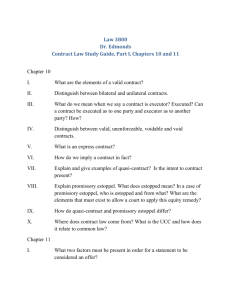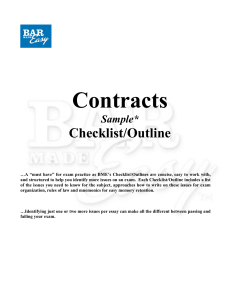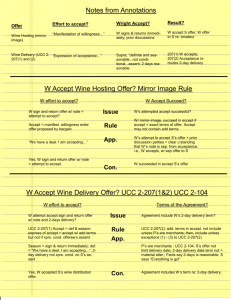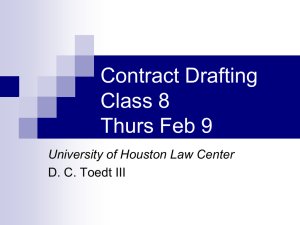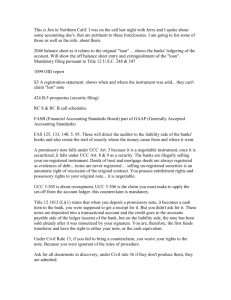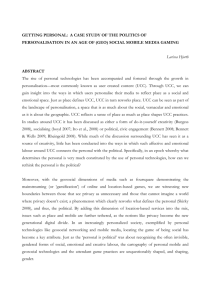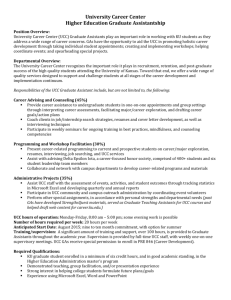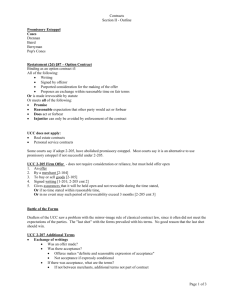UCC Contract Law Template: Rules & Key Concepts
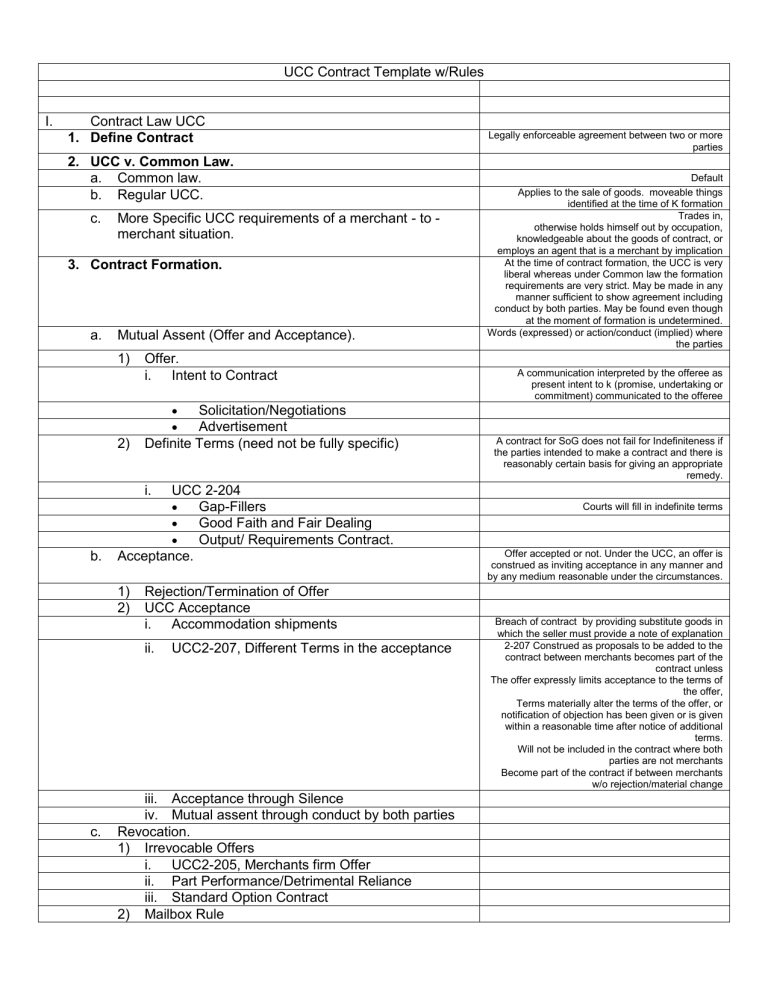
I. Contract Law UCC
1. Define Contract
2. UCC v. Common Law. a. Common law. b. Regular UCC. merchant situation.
3. Contract Formation.
1) Offer. i. i.
Intent to Contract iii. Acceptance through Silence iv. Mutual assent through conduct by both parties c. Revocation.
1) Irrevocable Offers i. ii.
UCC2-205, Merchants firm Offer
Part Performance/Detrimental Reliance iii. Standard Option Contract
2) Mailbox Rule
UCC Contract Template w/Rules
Legally enforceable agreement between two or more parties c. More Specific UCC requirements of a merchant - to - a. Mutual Assent (Offer and Acceptance).
2) Definite Terms (need not be fully specific)
1) Rejection/Termination of Offer
2) UCC Acceptance i. Accommodation shipments ii.
Solicitation/Negotiations
Advertisement
UCC 2-204
b. Acceptance.
Gap-Fillers
Good Faith and Fair Dealing
Output/ Requirements Contract.
UCC2-207, Different Terms in the acceptance
Default
Applies to the sale of goods. moveable things identified at the time of K formation
Trades in, otherwise holds himself out by occupation, knowledgeable about the goods of contract, or employs an agent that is a merchant by implication
At the time of contract formation, the UCC is very liberal whereas under Common law the formation requirements are very strict. May be made in any manner sufficient to show agreement including conduct by both parties. May be found even though at the moment of formation is undetermined.
Words (expressed) or action/conduct (implied) where the parties
A communication interpreted by the offeree as present intent to k (promise, undertaking or commitment) communicated to the offeree
A contract for SoG does not fail for Indefiniteness if the parties intended to make a contract and there is reasonably certain basis for giving an appropriate remedy.
Courts will fill in indefinite terms
Offer accepted or not. Under the UCC, an offer is construed as inviting acceptance in any manner and by any medium reasonable under the circumstances.
Breach of contract by providing substitute goods in which the seller must provide a note of explanation
2-207 Construed as proposals to be added to the contract between merchants becomes part of the contract unless
The offer expressly limits acceptance to the terms of the offer,
Terms materially alter the terms of the offer, or notification of objection has been given or is given within a reasonable time after notice of additional terms.
Will not be included in the contract where both parties are not merchants
Become part of the contract if between merchants w/o rejection/material change
d. Consideration.
1) Bargained for Exchange. i. Sham/nominal consideration
2) Legal Detriment. i. Illusionary Promise.
Output/Requirement contracts
3) Promissory Estoppel/Detrimental Reliance
4) UCC Modification i. No consideration require
Good Faith and Fair Dealing
Must meet requirements of the Statute of
Frauds ii. Accord and Satisfaction iii. Substituted Agreement
4. Statute of Frauds . a. Sale of Goods $500 or More
1) Specialty Manufactured Goods Exchange
2) Estoppel Exception
3) Goods Accepted and paid for Exception b. .
5. Parol Evidence Rule . a. • Traditional or Four Corners Rule. b. • Modern or Corbin View
1)
•
Total Integration v. Partial Integration i. • Merger Clause. c. • Missing Terms.
6. Contract Formation Defenses a. Etc. b. Other Contract Defenses. c. • Mistake. d. . e. Mutual mistake. f. • Reformation. g. • Discharge of Performance. h. . i. • Unconscionability. j. • Illegality. k. • Duress/Fraud/Misrepresentation. l. • Capacity. m. • Recission.
7. Performance/Conditions. a. Unilateral Contract Bilateral Contract – No distinction between Unilateral and bilateral contract b. Express
1) Satisfaction of a Party. c. Implied d. Constructive e. Excuse of Condition
1) Hindrance
New K (accord) extinguishes old K upon performance of new K (satisfaction). EX “Payment in
Full ”
SOF requires a writing of must be written which is satisfied by performance or memo between merchants
UCC 2-201 sale of goods worth $500.00 or more
No K if mutual (value isn’t a mistake.) Can not take advantage of an obvious error)
2) Waiver f. Discharge of Condition
1) Impossibility of Performance
2) Financial Impracticability
3) Frustration of Purpose
8. Breach of Contract Claim. a. Prospective Inability to Perform/Voluntary Disablement
1) Right to adequate Assurances b. Anticipatory Repudiation.
1) Retraction of the Repudiation
2) Mitigation c. The Perfect Tender Rule, UCC2-601
1) Buyer’s Right of Inspection and Rejection
2) Seller’s right to Cure
3) Installment Contracts
4) Divisible Contracts
5) Termination of Performance for Material Breach i. Material v. a minor breach.
9. UCC Remedies a. Buyer Remedies
1) Mitigation/Avoidable Damages
2) Cover
3) Contract/Marker price
4) Consequential Damages
5) Incidental Damages
6) Rejection
7) Resale
8) Specific performance/Replevin b. Seller Remedies
1) Mitigation/Avoidable Damages
2) Contract/Resale differential
3) Lost Volume Seller
4) Action for Contract price c. Liquidated Damages.
10. Third-Party Issues a. Third Party Beneficiary
1) Intended/Incidental Beneficiary
2) Vesting Rights
3) Rights to Sue b. Assignment
1) Elements of Assignment
2) Effect of Assignment
3) Limitation of Assignment
4) Revocability of Assignments
5) Right to Sue c. Delegation
1) Elements of Delegation
2) Limitation on Delegations
3) Right to sue
4) Novation
11. Quasi-Contract Claim by Breaching Party . a. For the Plaintiff
b. Restitution Recovery in Quasi-Contract c. Restitution Benefit Conferred. Damage Caused.
1) Unjust Enrichment d. For the Defendant
1) Quantum Meruit i. Restitution Recovery in Quasi-Contract.

